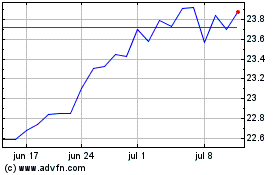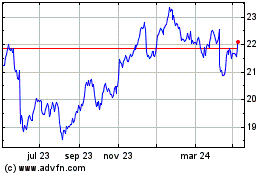U.S. Approves T-Mobile, Sprint Merger -- Update
26 Julio 2019 - 11:29AM
Noticias Dow Jones
By Drew FitzGerald and Sarah Krouse
The Justice Department approved T-Mobile US Inc.'s merger with
Sprint Corp. after the companies agreed to create a new wireless
carrier by selling assets to satellite-TV provider Dish Network
Corp.
The landmark antitrust agreement seeks to address concerns that
the combination of T-Mobile, the nation's No. 3 carrier by
subscribers, and No. 4 Sprint will drive up prices for consumers.
It would leave more than 95% of American cellphone customers with
the top three U.S. operators.
A deal brokered by the Justice Department will require Dish,
which has been sitting on valuable airwaves, to build a 5G network
for cellphone customers. To help it get started, T-Mobile will sell
Sprint's prepaid brands to Dish and give access to the combined
carrier's network for seven years.
"The remedies set up Dish as a disruptive force in wireless"
with the pieces needed for the company to have a network that is
ready to go, Makan Delrahim, the Justice Department's antitrust
chief, said in a news conference.
Critics of the arrangement include a group of state attorneys
general that broke with the Justice Department and have filed an
antitrust lawsuit seeking to block the more than $26 billion
merger. Five states that weren't part of the lawsuit joined the
federal government in the settlement announced Friday.
"Why scramble so much to create a fourth competitor when you
already have one?" said Samuel Weinstein, an assistant law
professor at the Cardozo School of Law at Yeshiva University who
worked previously in the Justice Department's antitrust unit.
The deal gives Dish, a satellite-TV provider, about 9 million
Sprint prepaid cellphone customers and additional wireless
spectrum. Those subscribers represent about a fifth of Sprint's
customer base.
T-Mobile and Sprint must also give Dish access to at least
20,000 cell sites and hundreds of retail locations. The new
T-Mobile must provide "robust access" to its network, the Justice
Department said.
The union of T-Mobile and Sprint, years in the making, would
create a wireless company with more than 80 million U.S. customers,
closing the gap with Verizon Communications Inc. and AT&T Inc.,
which each have roughly 100 million wireless customers. It also
would fulfill a long-held goal of Japan's SoftBank Group Corp.,
which owns most of Sprint, and Deutsche Telekom AG, which controls
T-Mobile.
Shares of T-Mobile rose on the news and are trading near
all-time highs. Sprint shares also were higher. Dish, whose stock
price has slumped this week on news of the arrangement, were up
Friday.
Federal Communications Commission Chairman Ajit Pai, who had
previously backed the deal, said Friday the Justice Department
settlement, coupled with T-Mobile and Sprint's earlier commitments
to deploy a nationwide 5G network, will preserve competition and
advance U.S. leadership in rolling out next-generation
networks.
U.S. carriers have been battling for customers in the $180
billion voice-and-data market, where growth has slowed now that the
companies have rolled out unlimited data plans and most Americans
have upgraded to smartphones.
The federal approval for T-Mobile and Sprint caps a more than
yearlong review of a combination that fell apart twice in the past
five years over terms of the deal or fears that the Justice
Department would object.
The Justice Department, under the Obama administration, told the
companies that shrinking from four to three national providers was
anticompetitive. The companies tried again under Trump appointees
to push the deal through, ultimately agreeing to divest assets to
Dish to win approval.
In its agreement with the government, T-Mobile promised not to
raise prices for three years and cover 97% of the U.S. population
with 5G service in three years.
T-Mobile has been adding millions of customers at the expense of
its rivals, pushing unlimited data plans and lower prices than the
incumbents. Sprint, despite owning valuable airwaves, has been
shedding millions of subscribers and has struggled to be
profitable.
T-Mobile surpassed Sprint to become the No. 3 player by
subscribers and argued the acquisition of the smaller carrier's
airwaves would help speed its deployment of a 5G network so that it
could better compete with Verizon and AT&T.
Dish, which generated $13.6 billion in annual revenue last year,
had about $13 billion of net debt before the deal. It will need to
shell out billions of dollars in the coming years to absorb the
wireless carriers' cast-off assets, build its own network and vie
for customers.
Write to Drew FitzGerald at andrew.fitzgerald@wsj.com and Sarah
Krouse at sarah.krouse@wsj.com
(END) Dow Jones Newswires
July 26, 2019 12:14 ET (16:14 GMT)
Copyright (c) 2019 Dow Jones & Company, Inc.
Deutsche Telekom (TG:DTE)
Gráfica de Acción Histórica
De Mar 2024 a Abr 2024

Deutsche Telekom (TG:DTE)
Gráfica de Acción Histórica
De Abr 2023 a Abr 2024
